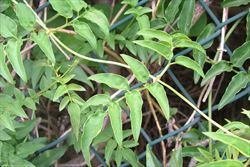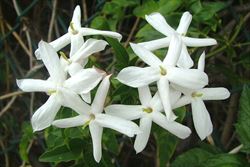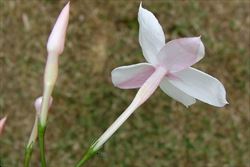Click on images to enlarge

habit (Photo: Sheldon Navie)

habit (Photo: Sheldon Navie)

older woody stem (Photo: Sheldon Navie)

younger stems and paired leaves (Photo: Sheldon Navie)

once-compound leaf with several elongated leaflets (Photo: Sheldon Navie)

flowers (Photo: Sheldon Navie)

close-up of flower and flower buds (Photo: Sheldon Navie)

close-up showing flower tube and small sepals (Photo: Sheldon Navie)
Scientific Name
Jasminum polyanthum Franch.
Family
Oleaceae
Common Names
Chinese jasmine, climbing jasmine, common jasmine, jasmine, pink jasmine, star jasmine, white jasmine, winter jasmine
Origin
Native to China.
Naturalised Distribution
Naturalised in some parts of eastern Australia (i.e. in the coastal and sub-coastal districts of northern and central New South Wales and in south-eastern Queensland).
Naturalised overseas in New Zealand.
Notes
Jasmine (Jasminum polyanthum) is regarded as an environmental weed in New South Wales, and as a "sleeper weed" in other parts of Australia. This species has escaped cultivation as a garden ornamental. It climbs rapidly into the tree canopy and covers vegetation at all levels, blocking light and restricting the growth and regeneration of native species. Its weight may also bring down trees and it is a potentially a serious weed of rainforests and riparian areas.
Jasmine (Jasminum polyanthum) appears on several local and regional environmental weed lists in eastern New South Wales (e.g. in Warringah Shire, Blue Mountains City, Hornsby Shire, the Hawkesbury region and the wider Sydney and Blue Mountains region) and has been reported in conservation areas in this state (e.g. Angophora Reserve and Elizabeth Brownlee Reserve). It is also listed as an environmental weed in Knox City in Victoria and has invaded secondary forest margins, scrub and waste ground in New Zealand.

